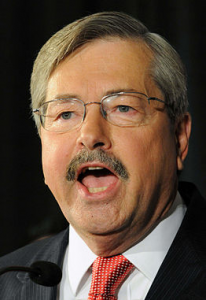Ed. Iowa has taken other steps to undermine faculty governance, including disbanding the faculty senate at one campus. The Governor of Iowa, Terry Branstad, is the former President of DesMoines University, an Osteopathic medical school..
“I think we need to have professors in the classroom and not on sabbatical and out researching and doing things to that effect,” Iowas State Rep. Murrell G. Smith Jr.
 By Eric Kelderman, The Chronicle
By Eric Kelderman, The Chronicle
Republicans dominated state elections in November, promising to shrink the size and cost of government to help erase tens of billions of dollars in budget shortfalls. But the proposals they’ve floated since taking office look more like political point-scoring than serious cost-cutting.
Although significant budget cuts still loom for higher education in many states, much of the recent legislation aims to curb what some lawmakers apparently imagine as commonplace excesses of faculty employment: six-figure salaries, light teaching loads, frequent sabbaticals on faraway islands.
“A lot of these political maneuvers are based on outdated assumptions,” says Daniel J. Hurley, director of state policy for the American Association of State Colleges and Universities. He and others believe that the bills amount to state government’s unnecessary meddling in campus governance.
Wisconsin sits on the leading edge, where Gov. Scott Walker, a Republican, has proposed rolling back union bargaining rights for University of Wisconsin faculty, staff, and graduate students. A similar bill has been introduced in Ohio and is backed by Gov. John R. Kasich, another Republican elected last fall.
Changes in collective bargaining could well have a broad impact on higher education—and have led to protests by faculty members and others in several states—but a number of narrower bills being considered in some statehouses are seen as a more direct attack on academic affairs.
A measure limiting sabbaticals to 3 percent of the faculty at any one time at Iowa’s three public universities is expected to be signed by the Republican governor, a former college president, as part of a budget bill there. Another proposal in Iowa, which has already died in the Legislature, sought to force the University of Iowa to sell its most valuable painting, Jackson Pollock’s “Mural,” worth an estimated $100-million to $140-million, to pay for undergraduate scholarships.
Faculty members have failed to make lawmakers aware of how hard they really work, says Cary Nelson, president of the American Association of University Professors.
Tenure came under fire recently in Utah, where a bill to eliminate the practice was introduced in the state’s House of Representatives. The measure, rejected last week by the Education Committee in the Utah House of Representatives, was sponsored by Rep. Christopher N. Herrod, a Republican, who has also proposed legislation to require greater state oversight of the University of Utah’s public-radio station.
Lawmakers are inserting themselves even more directly into the classroom in South Carolina, where a proposal would require professors to teach a minimum of nine credit hours per semester.
“I think we need to have professors in the classroom and not on sabbatical and out researching and doing things to that effect,” State Rep. Murrell G. Smith Jr., a Republican, told the Associated Press.
In this economic environment, measures to rein in the faculty are a reflection of lawmakers’ notion that higher education has not done its part to control its own spending or limit tuition increases, says Frederick M. Hess, a higher-education expert with the libertarian-leaning American Enterprise Institute. He, for one, believes that colleges have to do more to help states operate within their means.
Cary R. Nelson, president of the American Association of University Professors, believes higher education will see more legislative attacks on matters that colleges themselves should regulate, and questions whether lawmakers are right to micromanage campus policies: “Do we really need legislators deciding if Sally should get a sabbatical next year?”
But he put part of the blame on professors, saying faculty members have worked for too long in isolation and done a poor job of communicating how many hours they actually put in.
“In my first 25 years as a faculty member, I took one summer vacation,” Mr. Nelson says. “That kind of commitment is just pretty common.”

